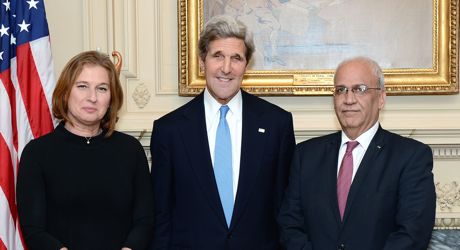IN THE MEDIA
Risks aplenty in minefield of Mid-East peace talks
August 2, 2013 | Colin Rubenstein

by: Colin Rubenstein
From: The Australian – August 02, 2013 12:00AM
ON Sunday, Israel’s cabinet made the agonising decision to authorise the staggered release of 104 Palestinian prisoners – including notorious mass murderers convicted for acts of wanton terror – in order to satisfy a Palestinian precondition for peace talks that began this week in Washington.
The risky move underscores some of the perils accompanying US Secretary of State John Kerry’s herculean efforts to reconvene negotiations which have substantively floundered since the Palestinians walked away from a generous, comprehensive peace offer from then-Israeli prime minister Ehud Olmert in late 2008.
It should be remembered that while it is generally true that talking is better than not talking, failed negotiations can often create genuine negative consequences. This is why US mediators must now proceed with even greater care and caution – and learn significant lessons from past mistakes.
Israeli peace negotiator Tal Becker likes to say that while at least 75 per cent of Israelis consistently support making a two-state peace agreement with the Palestinians, an even higher percentage have come to believe it will never happen.
This growing lack of faith in the seriousness of the other side and confidence in the peace process – a sentiment that has been echoed in Palestinian surveys – can be traced back to repeated peace process stalls and failures.
Meanwhile, never far from Israeli minds is the terror of the second intifada, which claimed the lives of more than 1000 of its citizens between September 2000 and January 2005. Palestinian officials have since admitted this intifada was orchestrated by then-Palestinian president Yasser Arafat after he rejected a US brokered deal at Camp David in July 2000.
Israelis also learned painful lessons after the unilateral withdrawal from Gaza in 2005 strengthened and entrenched Hamas, and led to a new, unprecedented and ongoing rocket threat on Israel’s southern communities.
Moreover, Israel is facing an unpredictable, unstable and challenging and regional security landscape, with Syria in the midst of a bloody civil war and Egypt now under military rule.
On the other side, the Palestinian public has become conditioned to believe – in no small part by their leadership’s unrelentingly hostile anti-Israel rhetoric – that negotiations are a folly that can only lead to an erosion and abdication of Palestinian “rights”, rights which in their view are justly owed to them and should therefore be non-negotiable.
Furthermore, state-run Palestinian newspapers and television continue to portray Israel as a bitter enemy, not a potential peace partner, and routinely reassert the Palestinian claim to cities and towns inside pre-1967 Israel.
It’s no surprise then that, with the exception of Mahmoud Abbas’s Fatah, all factions within the PLO have come out against the resumption of the peace talks under Kerry’s terms.
Finally, it is doubtful that the Fatah-led Palestinian Authority – years overdue for new elections and unable to represent Gazans since Hamas forcibly took over the Gaza Strip in 2007 – has any clear mandate to make concessions on behalf of West Bank Palestinians, let alone the Palestinian diaspora.
All this means that there is little confidence that the gulf between the parties on key final status issues such as borders, Jerusalem, refugees and security arrangements can be bridged.
Does this mean Kerry’s efforts are pointless? Certainly not for lack of resolve on Israel’s part. Despite his hardline reputation abroad, Israeli politics watchers have noted what appears to be a new urgency for a two-state resolution in Prime Minister Benjamin Netanyahu’s rhetoric. He has been publicly saying a Palestinian state is a crucial strategic interest for Israel to obviate the possibility of it becoming a bi-national state in the future, an argument he has not previously made publicly.
It is for this reason Netanyahu has given Justice Minister Tzipi Livni, a major figure in prior peace negotiations and a long-time political rival, wide scope to hammer out an agreement working alongside seasoned Palestinian negotiator Saeb Erekat together with the very astute and experienced US-appointed mediator Martin Indyk. A weakening position for peace naysayer Hamas in Gaza, which has accelerated since the deposing of its Muslim Brotherhood allies in neighbouring Egypt, has also increased prospects for progress as it gives Fatah more room to explore two-state options.
However, peace cannot be achieved by turning a blind eye to inconvenient realities or downplaying acute risks that exist every step of the way. If it becomes clear that a final deal is not achievable, as is unfortunately likely, the opportunity to move forward in other ways must not be lost. An interim arrangement must be pursued which brings the two sides closer to the end goal of real peace, preferably including the “interim Palestinian state with temporary borders” proposed in the 2004 Roadmap for Peace.
Diplomatic creativity as well as sustained pressure will likely be required to overcome particularly Palestinian objections to this idea. These US-brokered peace efforts deserve widespread support, including by Australia, but they also require watchful vigilance.
Realistic goals and a determined effort not to allow lofty dreams to unravel smaller but very valuable current achievements are essential – not least because the consequences of another peace process failure could be severe.
Colin Rubenstein is executive director of the Australia/Israel & Jewish Affairs Council.
Tags: Israel





